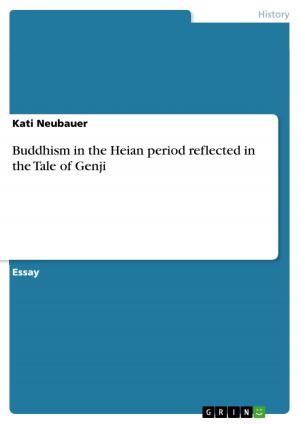Dissent in the Soviet Union: The Role of Andrei Sakharov in the Human Rights Movement
Nonfiction, Social & Cultural Studies, Political Science| Author: | Kirsten Kuptz | ISBN: | 9783638278348 |
| Publisher: | GRIN Publishing | Publication: | May 25, 2004 |
| Imprint: | GRIN Publishing | Language: | English |
| Author: | Kirsten Kuptz |
| ISBN: | 9783638278348 |
| Publisher: | GRIN Publishing |
| Publication: | May 25, 2004 |
| Imprint: | GRIN Publishing |
| Language: | English |
Seminar paper from the year 2004 in the subject Politics - International Politics - Region: Russia, grade: A, Johns Hopkins University, language: English, abstract: 'Other civilizations, including more 'successful' ones, should exist an infinite number of times on the 'preceding' and the 'following' pages of the Book of the Universe. Yet this should not minimize our sacred endeavors in this world of ours, where, like faint glimmers of light in the dark, we have emerged for a moment from the nothingness of dark unconsciousness of material existence. We must make good the demands of reason and create a life worthy of ourselves and of the goals we only dimly perceive.' (From the Nobel Lecture of Andrei Sakharov, 1975) Dissent in the Soviet Union was not well known: neither in the West nor in Soviet society itself. Prior to the end of total terror with the death of Stalin in 1953, dissent in the Soviet Union could not be expressed publicly. In his first years in power, Khrushchev tolerated a certain degree of free discussion and even released some political prisoners. Soon, however, the 'refreezing of the thaw' began, especially under Brezhnev; critics became too outspoken, and demands for free expression exceeded 'acceptable limits'. The Communist Party regained absolute control over the flow of information and ideas, and over all kinds of literature. Yet despite the ideological penetration and strict surveillance of society through the authorities and the KGB in particular, some people were able to fight for their rights and for a rival vision of freedom and justice. It is debatable whether the term 'movement' can be appropriately applied to dissent in the Soviet Union since it lacked any organizational structure or formal program. That said, the term is commonly used to describe the group of people, emerging in the early 1960s, who raised their voice against policies of the regime. Soon, the physicist Andrei Sakharov was considered to represent the spirit of the movement: 'he embodies the human rights movement in his own person: self-sacrifice, a willingness to help persons [...] who are illegally prosecuted; intellectual tolerance, unwavering insistence on the rights and dignity of the individual, and an aversion to lies and to all forms of violence (Alexeyeva 1985: 332).' A father of the Soviet hydrogen-bomb, Sakharov's life came to a radical turning-point when his interest shifted from physics - which had placed him among the elite of Soviet society - to politics - which converted him into a nonconformist and Nobel Peace Prize laureate. [...]
Seminar paper from the year 2004 in the subject Politics - International Politics - Region: Russia, grade: A, Johns Hopkins University, language: English, abstract: 'Other civilizations, including more 'successful' ones, should exist an infinite number of times on the 'preceding' and the 'following' pages of the Book of the Universe. Yet this should not minimize our sacred endeavors in this world of ours, where, like faint glimmers of light in the dark, we have emerged for a moment from the nothingness of dark unconsciousness of material existence. We must make good the demands of reason and create a life worthy of ourselves and of the goals we only dimly perceive.' (From the Nobel Lecture of Andrei Sakharov, 1975) Dissent in the Soviet Union was not well known: neither in the West nor in Soviet society itself. Prior to the end of total terror with the death of Stalin in 1953, dissent in the Soviet Union could not be expressed publicly. In his first years in power, Khrushchev tolerated a certain degree of free discussion and even released some political prisoners. Soon, however, the 'refreezing of the thaw' began, especially under Brezhnev; critics became too outspoken, and demands for free expression exceeded 'acceptable limits'. The Communist Party regained absolute control over the flow of information and ideas, and over all kinds of literature. Yet despite the ideological penetration and strict surveillance of society through the authorities and the KGB in particular, some people were able to fight for their rights and for a rival vision of freedom and justice. It is debatable whether the term 'movement' can be appropriately applied to dissent in the Soviet Union since it lacked any organizational structure or formal program. That said, the term is commonly used to describe the group of people, emerging in the early 1960s, who raised their voice against policies of the regime. Soon, the physicist Andrei Sakharov was considered to represent the spirit of the movement: 'he embodies the human rights movement in his own person: self-sacrifice, a willingness to help persons [...] who are illegally prosecuted; intellectual tolerance, unwavering insistence on the rights and dignity of the individual, and an aversion to lies and to all forms of violence (Alexeyeva 1985: 332).' A father of the Soviet hydrogen-bomb, Sakharov's life came to a radical turning-point when his interest shifted from physics - which had placed him among the elite of Soviet society - to politics - which converted him into a nonconformist and Nobel Peace Prize laureate. [...]















